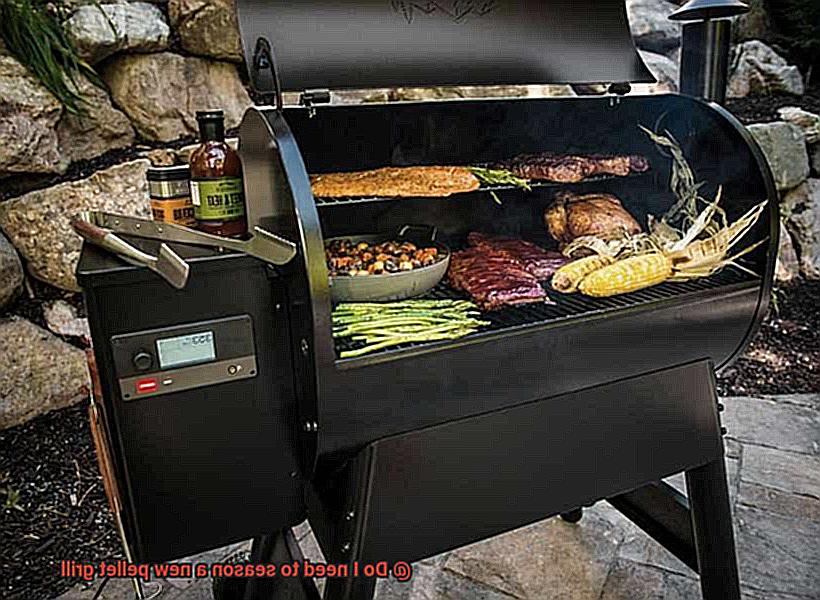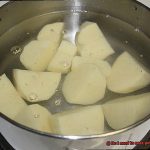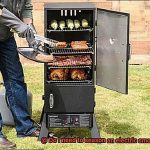Hey there, fellow grill enthusiast. So, you just got yourself a brand spanking new pellet grill. Congrats. You’re about to discover how delicious outdoor cooking can be with that wood-fired flavor on your favorite meats, veggies, and even desserts. But before you start firing up that bad boy and grilling away, there’s an important question you need to ask: do I need to season a new pellet grill?
The answer is a resounding YES. Just like seasoning a cast-iron skillet, seasoning your pellet grill ensures it performs at its best and protects it from rust. While some manufacturers claim their grills come pre-seasoned, it’s still recommended that you do it yourself to make sure it’s done properly. The good news is that the process is relatively easy and only takes a few simple steps.
In this blog post, we’ll dive into why seasoning your new pellet grill is crucial and provide step-by-step instructions on how to do it right. Trust us; your taste buds will thank you for taking the time to season your new pellet grill correctly – so let’s get started.
Contents
What is a Pellet Grill?
Also known as a pellet smoker, this outdoor cooking appliance runs on wood pellets made from compressed sawdust, available in delicious flavors like hickory, mesquite, applewood, and cherry.
Pellet grills are gaining popularity among outdoor cooking enthusiasts due to their precise temperature control and versatility. With an electronic controller regulating the amount of pellets fed into the combustion chamber, a pellet grill makes it easy to cook a variety of foods at different temperatures. Plus, the wood pellets impart a unique smoky flavor that can’t be found with other grilling methods.
Typically, pellet grills have a hopper that holds the wood pellets, a combustion chamber where the pellets are burned, and a cooking chamber where the food is placed. To get started with your new pellet grill, it’s important to season it properly. This involves cleaning the inside of the grill thoroughly with soapy water, heating it to a high temperature for an hour, and allowing it to cool down completely. This will remove any manufacturing residues and create a protective layer of seasoning oil on the grates to prevent rust and other forms of corrosion.
Why Do I Need to Season a New Pellet Grill?
Your brand-new pellet grill is undoubtedly a source of excitement and anticipation, but before you head straight to the cooking, there’s one essential step you shouldn’t overlook: seasoning your grill. You may wonder why this is necessary; let me explain.
Firstly, when you season your grill, you are removing any debris or chemicals left on its grates from the manufacturing process. These unwanted substances can be harmful if ingested and can affect the taste of your food. So, it’s crucial to get rid of them before you start cooking.
Secondly, seasoning creates a non-stick surface on the grates. This means no more frustrating moments of trying to pry off stubborn bits of food. When you coat the grates with oil during seasoning, it creates a protective layer that prevents food from sticking. This ensures that your food cooks evenly and that you get the best flavor possible.
Lastly, seasoning your new pellet grill can extend its lifespan. By removing any unwanted debris and creating a non-stick surface, you can prevent rust and corrosion on the grates. Rust and corrosion can damage your grill over time, but proper maintenance, including seasoning your grill regularly, can help keep it in top condition for years to come.
So, how do you season your new pellet grill? Follow these simple steps:
- Clean the grates thoroughly with soap and water.
- Heat up the grill to high temperatures for 30-45 minutes.
- Apply a thin layer of oil on the grates using a brush or spray bottle.
- Let the grill cool down completely before starting to cook.
How to Clean a New Pellet Grill Before Seasoning
Before you do so, it’s important to clean your grill thoroughly. Here are some tips on how to clean a new pellet grill before seasoning.
Remove Packaging Materials and Accessories
The first step is to remove any packaging materials or plastic covers from your new pellet grill. Also, remove any accessories that may have come with your grill. This will ensure that you have access to all areas of the grill for cleaning.
Use Soap and Water
Using warm soapy water and a soft cloth or sponge, wipe down the interior and exterior of your pellet grill. Pay special attention to the grates, drip tray, and grease bucket as these areas can accumulate build-up from shipping and handling. Be sure to use a mild soap, as harsh chemicals can damage the grill’s surfaces.
Rinse Thoroughly
After cleaning your grill, rinse it thoroughly with clean water. Make sure that all soap residues are removed, as they can affect the flavor of the food.
Allow the Grill to Dry Completely
Allow your grill to dry completely before proceeding with seasoning. You can leave it in the sun to dry or use a towel to wipe down all surfaces. It’s important to ensure that the grill is completely dry before seasoning, as moisture can affect the performance of the grill.
Check for Loose or Damaged Parts
While cleaning your grill, check for any loose or damaged parts. Tighten any loose screws or bolts and replace any broken parts before seasoning. This will ensure that your grill is in good working condition and safe to use.
Run an Initial Burn-Off (Optional)
Some pellet grill manufacturers recommend running an initial burn-off before seasoning. This involves heating the grill to a high temperature for around 30 minutes to burn off any remaining residues from manufacturing or storage. Check your grill’s manual for specific instructions on how to perform a burn-off.
Step-by-Step Guide for Seasoning a New Pellet Grill
But before you start cooking up a storm, it’s important to properly season your grill. Not only does this process burn off any residue from the manufacturing process, but it also helps prevent rust and extends the lifespan of your grill. Follow this step-by-step guide to ensure your new pellet grill is seasoned to perfection.
Step One: Clean the Grill Grates and Interior
Give your new pellet grill a thorough cleaning before seasoning. Use a grill brush or scraper to remove any loose debris from the grates and interior, then wipe everything down with a damp cloth. A clean surface ensures proper seasoning and prevents any unwanted flavors from contaminating your food.
Step Two: Preheat the Grill
Preheat your pellet grill to between 350°F and 400°F for about 15-20 minutes. This will help burn off any remaining debris or coatings from the manufacturing process. It also ensures that the oil will properly coat the grill’s interior.
Step Three: Coat the Interior with Oil
Choose a high smoke point oil such as vegetable oil, canola oil, or grapeseed oil. Pour a small amount of oil onto a cloth or paper towel and wipe down the grates and interior of the grill. A thin layer is all that’s needed to protect against rust and extend your grill’s lifespan.
Step Four: Let It Heat Up
Close the lid of the grill and let it heat up for another 15-20 minutes. This allows the oil to penetrate and coat the metal surfaces of your pellet grill. The heat also helps create a protective barrier against harsh weather conditions.
Step Five: Repeat
Repeat this process two to three times until you see a glossy sheen on your pellet grill’s interior. This ensures that your grill is well protected and ready for use. The more you season, the better protected your grill will be against rust and other weather-related damage.
Benefits of Seasoning a New Pellet Grill
Before you break out the steaks and burgers, there’s one important step you must take – seasoning your grill. This process of applying a protective layer to the metal surface is critical to ensuring optimal performance and longevity.
Seasoning your new pellet grill offers several benefits, including improved flavor, rust prevention, and extended lifespan. By creating a non-stick surface on the grates, seasoning promotes even cooking without sticking, resulting in better color, texture, and taste. Plus, it removes any manufacturing residues that may have accumulated during production.
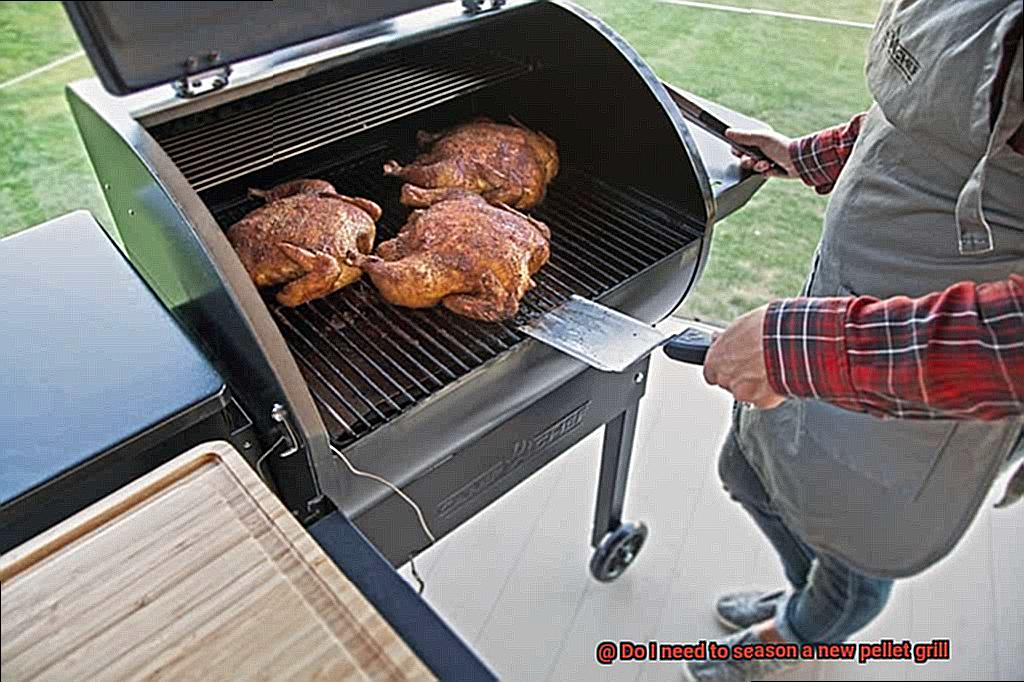
Rust and corrosion can cause significant damage to your grill over time. Fortunately, seasoning helps to prevent these issues by creating a protective layer that shields the metal surface from moisture and other damaging elements. As a result, your grill will last for many years without requiring replacement.
To extend the lifespan of your grill further, keep it clean and well-maintained. Proper maintenance ensures it continues to perform optimally, giving you delicious BBQ for years to come.
To season your new pellet grill correctly:
- Clean the grates with soap and water or a grill brush to remove any manufacturing residues.
- Apply oil to the grates using high smoke point oils like vegetable oil or canola oil.
- Preheat the grill to around 350°F and let it run for about 30-45 minutes.
- Let the grill cool down and then wipe the grates with a paper towel.
- Repeat this process several times until you get a nice, dark coating on the grates.
Common Mistakes When Seasoning a New Pellet Grill
Firstly, one of the most common mistakes is not properly cleaning the grill before seasoning it. This is a crucial step that should not be skipped. To ensure that the seasoning process is effective, remove any debris or residue left over from the manufacturing process.
Secondly, using too much oil during the seasoning process is another mistake that many people make. While oil is necessary to create a non-stick surface on the grill grates, using too much can lead to a build-up of excess oil and potential flare-ups during cooking. So be sure to use a light coat of oil to avoid this mistake.
Thirdly, not allowing enough time for the seasoning process is another common mistake. Some people believe that simply heating up the grill for a few minutes is enough, but in reality, it’s recommended to heat the grill for at least 45 minutes to an hour at high heat in order to fully season the grill. Take your time and allow your grill to properly season.
Finally, not properly maintaining your grill after the seasoning process is complete can lead to rust and other issues down the line. It’s important to regularly clean the grates and interior of the grill, as well as applying a light coat of oil before each use to maintain the non-stick surface.
To summarize, here are the four main points:
- Properly clean your grill before seasoning it.
- Use a light coat of oil during the seasoning process.
- Allow enough time for proper seasoning (at least 45 minutes to an hour).
- Regularly maintain your grill by cleaning it and applying a light coat of oil before each use.
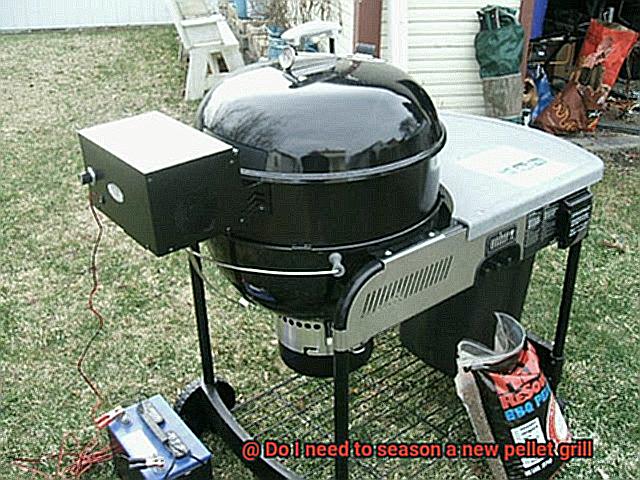
Tips for Proper Maintenance of Your Pellet Grill After Seasoning
Before you start cooking, it’s important to season your grill correctly. Once that’s done, proper maintenance is crucial to keep your grill functioning optimally. Here are five tips for keeping your pellet grill in excellent condition:
Keep it Clean
Cleaning your grill after each use is essential to prevent the buildup of grease and food particles. Use a grill brush or scraper to remove debris and wipe down the grates with a damp cloth. This will ensure that your food doesn’t stick to the grates during your next grilling session.
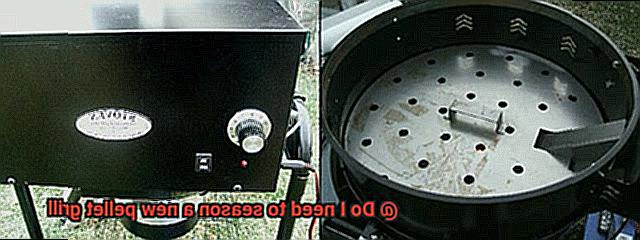
Empty the Ash Catcher
The ash catcher should be emptied regularly to allow for proper airflow and prevent temperature fluctuations. It’s recommended to empty the ash catcher after every 4-5 uses to avoid any ash buildup that can affect the performance of your grill.
Check the Pellet Hopper
The hopper holds the pellets that fuel your grill, so make sure it’s always at least half full before each use. Running out of pellets in the middle of cooking can cause temperature fluctuations and affect the cooking time.
Clean the Drip Tray
The drip tray collects excess grease and fat during cooking, so it’s important to clean it regularly to prevent buildup and fire hazards. A dirty drip tray can also affect the taste of your food.
Check for Wear and Tear
Inspect your pellet grill regularly for any signs of wear and tear, such as rust or cracks. Replace any damaged parts as soon as possible to prevent further damage to your grill and ensure it lasts for years.
27PNWZeOK5I” >
Conclusion
In conclusion, don’t skip the crucial step of seasoning your new pellet grill before firing it up for the first time. This simple process will ensure that you get the most out of your investment by promoting optimal performance and longevity. By removing any manufacturing residues, creating a non-stick surface on the grates, and protecting against rust and other forms of corrosion, you’ll be able to enjoy delicious wood-fired flavor for years to come.
While some manufacturers claim their grills come pre-seasoned, it’s still recommended that you take matters into your own hands to make sure it’s done right. To season your new pellet grill correctly, start by cleaning the grates thoroughly with soap and water. Then heat up the grill to high temperatures for 30-45 minutes before applying a thin layer of oil on the grates using a brush or spray bottle. Finally, let the grill cool down completely before starting to cook.
Proper maintenance is also essential to keep your pellet grill functioning optimally. Make sure to keep it clean after each use, empty the ash catcher regularly, check the pellet hopper before each use, clean the drip tray frequently, and inspect your grill for any signs of wear and tear.
By following these simple steps and tips for proper maintenance, you’ll be able to savor mouth-watering outdoor cooking on your favorite meats and veggies for years to come.

